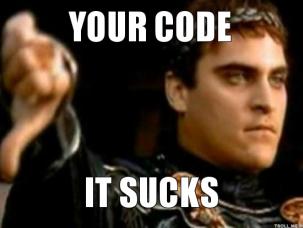Mike Walsh has put together an excellent topic for discussion, and I’ve read several responses to this; all of them are great, but most them are a little optimistic for my experiences. I like to think that most of my friends and peers in the #sqlfamily are happy people, so it’s understandable that their guidance is gentle and well-intentioned. Me? I’m happy. I’m also pretty suspicious of other people, so without further ado, the 4 dark truths I wished I’d known sooner.
 Some people are out to get you. Call it insecurity or good intentions gone bad, but some of your coworkers can’t take responsibility for their own actions and look to blame others. If you’re moderately successful at your job, there’s probably at least one person that is jealous of your success and is looking for ways to bring you down. Most people aren’t like this, and the trick is learning who’s a friend and who’s not. Spend time with friends, and defend yourself against enemies.
Some people are out to get you. Call it insecurity or good intentions gone bad, but some of your coworkers can’t take responsibility for their own actions and look to blame others. If you’re moderately successful at your job, there’s probably at least one person that is jealous of your success and is looking for ways to bring you down. Most people aren’t like this, and the trick is learning who’s a friend and who’s not. Spend time with friends, and defend yourself against enemies. - The best solution isn’t always the best solution. Engineers love to SOLVE problems; we don’t just like to get close to an answer. We want to beat it down. Unfortunately, in the real world, perfect is the enemy of the good; solutions that are exhaustive and comprehensive on paper are usually time-sucks to implement. Don’t get so wed to a solution that you overlook the cost of implementation.
 At some point, someone will judge your work and it won’t pass the bar. It’s really easy to pick apart bad code from a vendor (or perhaps from your enemy from point 1 above); it’s hard to make that some sort of critical judgment about your own code. However, if you’re not making mistakes today, then you’ve got nowhere to grow tomorrow. Take it easy on other people, point out the flaws in a constructive fashion, and hope that somebody does the same to you someday.
At some point, someone will judge your work and it won’t pass the bar. It’s really easy to pick apart bad code from a vendor (or perhaps from your enemy from point 1 above); it’s hard to make that some sort of critical judgment about your own code. However, if you’re not making mistakes today, then you’ve got nowhere to grow tomorrow. Take it easy on other people, point out the flaws in a constructive fashion, and hope that somebody does the same to you someday. - The customer isn’t always right, but they always think they are. I’ve had customers argue with me for days about something that I could demonstrate was 100% wrong; it doesn’t matter, and at the end of the day the relationship with them as a customer was irreconcilable because of the argument rather than the initial facts. I’m not saying that you should capitulate to every whim of the customer; however, it’s less important to be right than it is to build a relationship. Relationships are built on truth and giving a little. Compromise and move on (or decide that it is better to move apart).

Hey Stu,
Good stuff here. I probably influenced the direction a little bit by starting off with a self assessment of areas I can improve on and could have improved on much sooner in my career.
This stuff? It’s all great stuff. I really like trying to make sure that perfect doesn’t become the enemy of the good. And paranoia? Absolutely. I wrote a post when I was relatively new to blogging about how paranoid control freaks make excellent DBAs 😉 http://www.straightpathsql.com/archives/2009/06/paranoid-control-freak-have-i-got-a-career-for-you/
This is great stuff, Stu. Looking forward to linking to this one in the recap. Thanks for sharing.